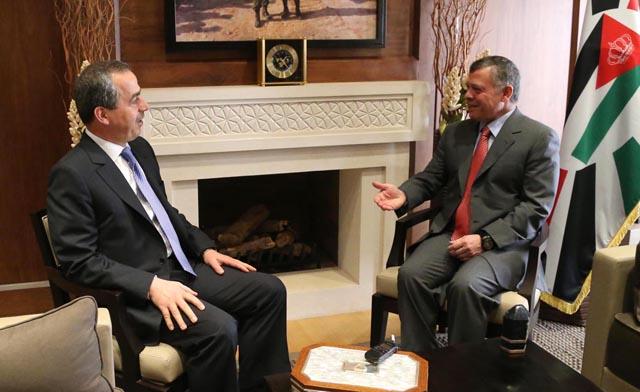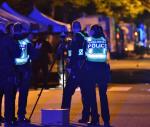You are here
‘King sent strong foreign policy message via interview ahead of summit’
By Omar Obeidat - Mar 23,2014 - Last updated at Mar 23,2014

AMMAN – His Majesty King Abdullah has sent a strong foreign policy message to world and regional players ahead of the Kuwait-hosted Arab summit, politicians and analysts said Sunday.
In his interview with the London-based Al Hayat Arabic daily, published Saturday, the King succeeded in delivering the message, which also covered local issues related to the regional situation, like the role of the Islamist opposition and internal reactions to developments in the Mideast peace process.
They noted in remarks to The Jordan Times over the phone that the King has also stressed Jordan’s higher interests are always at the core of its policies, particularly in relation to the peace process and efforts to end the Palestinian-Israeli conflict.
The timing of the interview is “very important” as His Majesty wanted to outline the Kingdom’s policy regarding regional and domestic issues, said Jawad Anani, former Royal Court chief and several-time minister.
“Jordan’s policy has always been based on reason not emotions,” said Anani, who is also a senator, adding that Arab countries, which have different views regarding certain issues, should realise that the Jordanian foreign policy is built on realism and the country’s own interests.
Regarding domestic issues, particularly concerning reforms and the Muslim Brotherhood, Anani noted that Jordan has adopted an evolutionary approach to boost people’s participation in decision making, adding the reform process is still ongoing.
“Our view to the Muslim Brotherhood is that they are centrists and the state is keen to keep them within the political landscape as long as they respect the laws and the Constitution,” the analyst said.
In his interview with Al Hayat, the King said that the Muslim Brotherhood is part of the political spectrum, just like any of the other many political actors in Jordan.
“In fact, they have not left the political arena to return to it. What has happened over the past years is that they adopted boycotting as the basis of their political action. Such an approach has revealed miscalculations on the part of the Brotherhood and adversely affected their credibility. At the end of the day, participation or boycotting is their call,” he said.
Political and economic analyst Zayyan Zawaneh agreed with Anani that the King sent a clear message that Jordan’s policies are firm and based on the country’s interests and the future of the region.
“Jordan is surrounded by turbulence — to the west you see the Palestinian-Israeli conflict, unrest in the eastern neighbour of Iraq and the Syrian crisis across the northern border,” he said, adding that the Monarch highlighted in the interview the regional challenges and their impact on Jordan.
“Jordan’s foreign and regional policies are lessons to countries on how to protect their interests during turmoil,” Zawaneh said.
The region, according to the analyst is seeing unprecedented polarisation and Jordan has worked out a separate path based on realism and domestic and regional interests.
“The King said that the Muslim Brotherhood is part of the political spectrum and I hope they get the message and understand Jordan’s distinctive character,” Zawaneh remarked.
According to Zawaneh, Jordan has undergone pressure from regional and international powers to act as the forefront of military intervention in Syria but the Kingdom was able to pass such pressure and to convince the world of the need of political solution.
“World powers talk now about a political solution to end the Syrian crisis, the very stance Jordan has always reiterated when almost everyone was belligerent,” he noted.
Zawaneh called on decision makers to speed up economic reforms in a bid to exit financial woes, adding that such reforms would strengthen Jordan’s political policies.
Minister of Political and Parliamentary Affairs Khaled Kalaldeh stressed that Jordan does not interfere in other countries’ affairs and affirmed that dialogue is always the key to end armed struggles and all types of conflict.
Kalaldeh said that in regards to the reform process, some people think that it is going slowly, but it has been proved that reforms in Jordan have been moving at the right pace.
The King said in the interview that political life in Jordan has not remained stagnant and “yet we have not leapt into the unknown. Moreover, we have not reduced reform to only elections. Rather, we have established an integrated and comprehensive system of democratic laws, institutions and practices”.
In regards to the Muslim Brotherhood, the minister said that authorities deal with them as long as they respect the laws, describing them as an important part of the political scene in the country.
Former minister of political development Musa Maaytah said the foreign policy of Jordan is an example of moderation and maturity.
Jordan was the first country to talk about political solution in Syria and has always called for establishing an independent Palestinian state.
In light of Arab divisions, the King called for unity and to bring the positions of Arab countries closer to deal with challenges facing the Arab world, Maaytah said.
Related Articles
Economists and sector leaders on Saturday welcomed His Majesty King Abdullah’s instructions to the government to draw up a 10-year strategy to stimulate the Kingdom’s economy.
The notion of “a substitute homeland for Palestinians in Jordan” is being manipulated by certain political figures to place pressure on the establishment and decision makers to gain personal benefits, analysts and politicians agreed on Monday.
AMMAN — Deputy Prime Minister and Minister of Foreign Affairs and Expatriates Ayman Safadi on Monday received Kuwaiti Foreign Minister Sheik
















